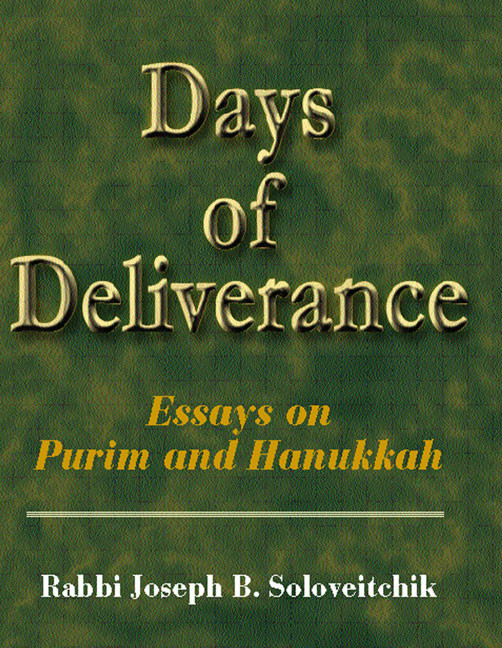The Kosher Bookworm: Season For Miracles and Learning
One unique liturgical feature of this holiday is the recitation within the Amidah, and Birkat Hamazon of Al Hanissim acknowledging the miracles of that long ago era, of history’s first open conflict , the struggle for freedom of religion between pagan domination and monotheism; Greek culture versus Judaism.
According to Rabbi Elie Munk in his classic commentary on the siddur, “The World of Prayer” [Feldheim, 2007] “The earliest source containing the text of Al Hanissim is tractate Soferim 20, but the Geonim and later authorities have handed down versions varying slightly from this original.” Rabbi Munk goes on to further detail the variant texts of this prayer and of the responsa of several authorities on the content and word use contained in the received text.
Rabbi Joseph B. Soloveitchik in his commentary on Al Hanissim in the recently published “The Koren Mesorat Harav Siddur” [Koren Publishers, OU Press, 2011] makes the following observation concerning the concept of ritual purity in the liturgy as recited in Al Hanissim.
“The impure into the hands of the pure”
“The Hasmoneans fought not only against enslavement to an imperial power, but also, and perhaps especially, against defilement. They fought for purity of the soul of the entire Jewish collective, and were successful in that struggle as in their political battles. They proved that aside from defeating an enemy on the battlefield, they could purify the spiritual defilement of a whole population – one which has sunk deeply into impurity of the soul and contamination of the spirit.”
The spiritual theme of this teaching taken from the Rav’s writings on Chanukah,”Days of Deliverance”, [Ktav Publishers, Toras HaRav Foundation, 2007] is further elaborated upon by the Rav wherein he states that , “the victory did not consist so much in the political achievements as in religious freedom, in the purification of the Temple and re-kindling the eternal Jewish light.
“It is true that political freedom was also achieved, but that was not the major point. The political holiday was the temporary Chanukah; the Chanukah for generations is a holiday of purifying the temple and of lighting candles.”
On this same subject the Rav further reinforces the message by stating that, “This miracle – the miracle of the victory over defilement – has eternal value. Since the Hasmonean period, the recovery of purity has remained the cornerstone of our faith. We have had any number of sects, apostates, and converts out of the faith, but the people as a whole were not defiled. The miracle of the Hasmonean period was the miracle of purification, which continues in our days.”
This is both the history and the spiritual lesson of Chanukah as seen through the text of the Al Hanissim prayer.
In his work “The Commentators’ Al Hanissim” [Feldheim, 2000] Rabbi Yitzchak Sender goes into some detail as to both structure and reasoning for the recitation of this prayer.
Among the major points made by Rabbi Sender is that “The prayer of Al Hanissim is part of the Hoda’a, thanksgiving prayer at the end of the Amidah. This thanksgiving prayer is recited whenever Jews receive divine protection and kindness…..which requires us to recite the blessing of Al Hanissim.”
Also given prominence in this classic work are the opinions of the Rambam, Rashi and Rav Elchanan Wasserman, hy”d, whose holy teachings are detailed in the following segment.
Commenting upon the verse from Al Hanissim, “And to cause them to stray from the laws of your will….” Rabbi Sender notes the following teaching by this martyred leader of our people. Please read this carefully.
“The simple explanation of these words would be that the Syrian Greeks sought to distract the Jews from the study of Torah and the practice of mitzvoth. Yet we might suggest that the words, “laws of your will” have a deeper meaning as well.
“HaRav Elchanan Wasserman, explains that there are three levels of commandments which we are obligated to observe:
Tzivui – a commandment given by G-d to man.
Dibur – a commandment which was commanded to man by the prophets.
Ritzon Haboreh – The will of G-d. Although these commandments were not committed to writing in the holy writ, yet the sages informed us of the will of G-d.
“All three of the above categories of mitzvoth are alluded to in Jeremiah:
“And they shall build high places of the Baal, to burn their sons in fire as burnt offerings to the Baal, which I never commanded nor spoke of, nor even considered in my heart.”
“And the Targum here translates this as:
“This was never commanded in the Torah, nor sent by any messenger, nor was it ever my will.”
“Thus, we might say that what is being alluded to here in the phrase, “And to cause them to stray from the laws of your will” – is that not only did the Syrian Greeks attack the Torah itself, but they attacked even the teachings of the Sages which reveal to us the Will of G-d.”
Considering the fate of Rav Wasserman, these words should be read, learned and taught with deep devotion.
I conclude this week’s essay with the verse, “demanding that they abandon Your Torah.” Rabbi Reuven Hammer’s comments on this verse: “The right to observe the Torah was at the core of the rebellion. Many perished when they defied the decrees against its observance, and were executed for this. This was the first time that religious martyrdom entered Jewish history. Unfortunately, it was not the last.” [Ohr Chadash]
For the most comprehensive Chanukah archive, check out The Chanukah Journal of Yeshivat Har Etzion at: www.vbm.org/chanuka.htm

 47.0°,
Mostly Cloudy
47.0°,
Mostly Cloudy 




